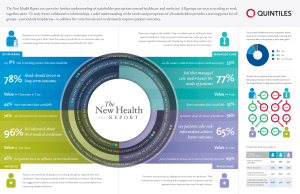Study highlights need for closing gaps in perceptions among the major stakeholders influencing new drug development
RESEARCH TRIANGLE PARK, N.C.--(BUSINESS WIRE)--Biopharmaceutical executives, managed care executives, physicians and patients with chronic illness foresee better prescription medicines in the U.S. over the next decade. However, they disagree on a number of vital healthcare issues, which may affect the drug development process, according to findings in The New Health Report 2011, commissioned by Quintiles, a leading global biopharmaceutical services company.
Specifically, there were important differences in how these key stakeholders define “value in healthcare.” Biopharma executives were the only group in which a majority includes outcomes as part of their value definition (61 percent). Forty-three percent of managed care executives mentioned “cost,” but not in conjunction with “outcomes,” as did 40 percent of physicians. A significant number of patients could not define value (31 percent) at all. Instead, many patients were more likely to say “quality of care” as defined by the doctor/patient relationship (17 percent), as did 33 percent of physicians.
“The multiple views on value need to be addressed as new drugs are developed. Among these key stakeholders, the differences of opinion in many areas are significant, illustrating the complexity of healthcare and how value is in the eye of the beholder,” said Jay Norman, President of Consulting at Quintiles. “This year’s New Health Report builds on last year’s findings, which showed that this constellation of stakeholders is intrinsically linked within the healthcare landscape. The gaps we are seeing in the new report suggest that these constituencies need to be aligned and working together if we are to truly improve healthcare in this country.”
This is the second year Quintiles has commissioned stakeholder research to better understand the dramatic changes within the drug development landscape. The New Health Report 2011 gauges perceptions of key stakeholders who are increasingly influential in the development of new drugs: biopharma executives, physicians, patients with chronic illness and managed care executives.
“The New Health describes the rapidly changing landscape of biopharma, in which the needs and desires of many stakeholders must be factored into how and which drugs are developed and approved,” said Oren Cohen, M.D., Chief Medical & Scientific Officer at Quintiles. “The striking differences in perception of value provide an important starting point for the various stakeholders to find common ground and ultimately improve patient outcomes.”
Other key findings from the latest New Health Report include:
- Most biopharma executives (81%), managed care executives (79%) and physicians (78%) say patients are not effectively improving their lifestyle and behavior to reduce health risks. Only one in three patients agrees (33%).
- Two-thirds of physicians feel that their prescribing choices are constrained by formularies (69%), and only 8% of physicians think managed care companies understand the needs of their practice.
- Three out of four biopharma executives (78%) feel the industry should focus primarily on health outcomes over short-term gains. However, they view lack of investor support as the greatest barrier to this strategy (71%).
- Three-quarters of patients (72%), biopharma executives (72%) and managed care executives (76%) are optimistic about improvements in the quality of prescription medication in the next 10 years; a lower proportion, but still the majority of physicians, agrees (59%).
- Physicians are perceived by all stakeholder groups as adding the most value to healthcare.
- Four out of five biopharma executives trust that their industry understands the needs of patients moderately or very well (79%); one in three patients feels biopharma does not understand patients’ needs very well (32%).
- Patients are more willing to allow their experiences with medications to be included in a global research database (69%) than they are willing to participate in a clinical trial (53%).
About The New Health Report
The New Health Report is a report based on a national survey of biopharmaceutical executives, physicians, patients with chronic illness and managed care executives. Richard Day Research of Evanston, Ill., conducted the survey on behalf of Quintiles and was responsible for all survey design, data analysis and data reporting. Data for this survey were collected online and by phone between January 5 and February 27, 2011. Survey sample respondents included 200 biopharmaceutical executives at the director level or above; 153 managed care executives at the director level or above; 400 primary care physicians; 103 board-certified specialists; and 1,000 U.S. adults ages 18+ who were diagnosed with and being treated for a chronic illness.
Access the complete results of the survey at: http://www.quintiles.com/newhealthreport.
About Quintiles
Quintiles is the only fully integrated biopharmaceutical services company offering clinical, commercial, consulting and capital solutions worldwide. The Quintiles network of 20,000 engaged professionals in more than 60 countries around the globe works with an unwavering commitment to patients, safety and ethics. Quintiles helps biopharmaceutical companies navigate risk and seize opportunities in an environment where change is constant. For more information, please visit www.quintiles.com.
Photos/Multimedia Gallery Available: http://www.businesswire.com/cgi-bin/mmg.cgi?eid=6734389&lang=en
Contacts
Quintiles
Mari Mansfield, Media Relations, 919-998-2639
mari.mansfield@quintiles.com
or
Greg Connors, Investor Relations, 919-998-2000
invest@quintiles.com

The New Health Report 2011 provides further understanding of stakeholder perceptions toward healthcare and medicine. (Graphic: Business Wire)




